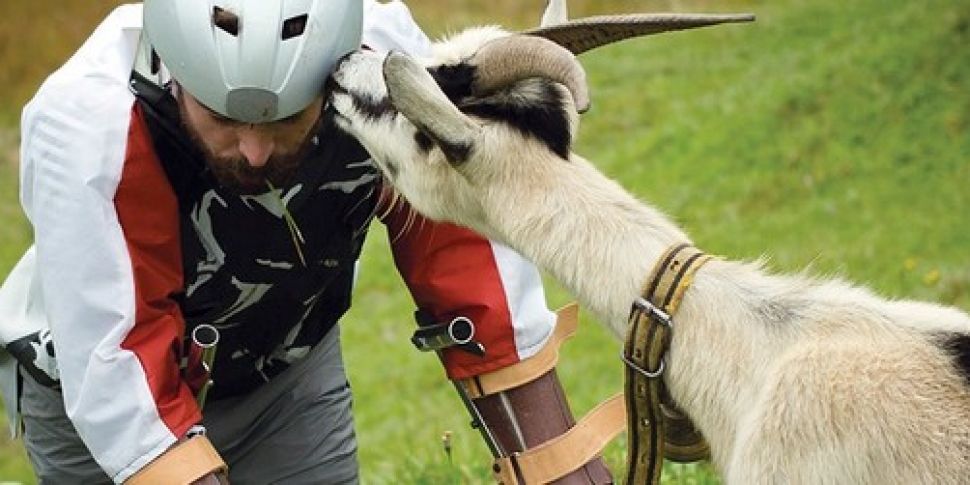In 2015, high on a hill was a lonely goatherd, watching as a British artist strapped on the prosthetic goat limbs he’d had fashioned in order to spend six days and six nights galloping across the Swiss Alps, leaving all of humanity’s troubles behind and becoming a goat. Lay ee odl lay ee odl-oo.
It’s not the everyday experience for the average animal enthusiast, but it was one that Thomas Thwaites, writer of the new book GoatMan: How I Took a Holiday from Being Human, told was inspired by an evening spent looking after a carefree canine.
“I was just at the end of my tether,” Thwaites told Newstalk’s Sean Moncrieff, “With a whole host of things; money, relationships, family, just the world in general. And I was dogsitting my niece’s dog, and it was just sitting there happily at my feet, panting away. And I just had that thought, ‘Look at you, you’re so lucky! You don’t have to deal with any of this stuff!’ So that was the genesis of the next nine months of my life.”
If the leap from dogsitting to hopping across central European mountains as a goat seems large, as Thwaites revealed, his first ambition was to try and become an elephant. The tusked mammals are, after all, also short-necked like human beings and he could envisage himself “clombering in a giant exo-skeleton.” But given that the size of their vertebrae wasn’t the only similarity, the idea of escaping the weight of human existence seemed impossible as an elephant.

[Tim Bowditch]
“But very soon, I started to find that elephants are not, sort of, a worry-free animal themselves. They’re one of the only other species on the planet that appears to have some kind of idea of their own mortality. When there is a traumatic death in the family, the rest of the elephants in the family will kind of gather around and mourn. And they even exhibit symptoms of post-traumatic stress. They’re kind of intelligent creatures like ourselves, and therefore full of anxiety and worry. And I wanted to escape all that.”
A chance encounter with a friend in a pub led him to a shaman, whose advice suggested spending the best part of a week living a hircine experience. This meant carrying out extensive research into constructing a costume that would allow Thwaites to roam on all fours, ruminate and digest grass with the aid of an extra stomach, and capture the attention of his new cloven friends by the way of a beard. But the reality of losing touch his personhood for the opportunity to become a goat proved far more difficult than he had ever thought it could be, mostly due to how physically draining it was.
“I had to take a fair few rests, because even though I had started this project with the dream that it would be beautiful to gallop over the hills and be free, the reality some months later was, ‘Ow, my knuckles kind of hurt. And my skin is kind of rubbing off. I’m heading, head first, down a mountain amongst the herd of 50 excited goats, and I don’t have any hands to stop myself from falling.’ So it wasn’t quite the kind of carefree, wondrous tripping-through-the-Swiss-Alps that I had hoped it would be.”

[Tim Bowditch]
Finding acceptance amongst the goatherd, at least, proved easier. Understanding the strict hierarchy of the all-female group’s social structure meant Thwaites new which goats to avoid getting in the way of, and he even managed to make a friend.
“There was this particular goat that was one of the first to come up and smell my beard when I was first introduced to the herd,” Thwaites said. “We just kind of tended to walk around together. I’d be eating on a patch of grass and walk off, and I’d look around and there would be this specific goat. And I could follow her. We just kind of hung out.”
The friendship and kinship with the goats would prove short-lived, however. After almost a week in the cold Swiss Alps, Thwaites was happy to pull off his hooves and return to the material comforts of mankind.
“It was a bit of a relief, actually. At the beginning of the project, I was hoping I could be a much better goat than I was able to be, even with all the help from a neuro-scientist, an anatomist, a prosthetist, biologists to help me with my grass digestion. And after all this, I was still no match for an actual goat. So it was kind of a relief to be back and be a bit warm again.”
You can listen back to Moncrieff’s full interview with Thomas Thwaites in the podcast below:









